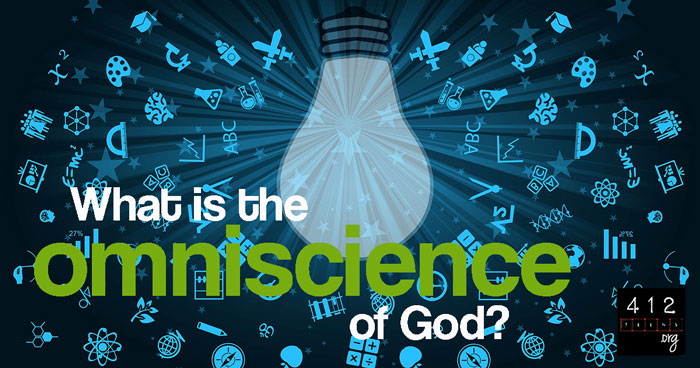What does it mean that God is omniscient?

One of the primary terms used to describe God is omniscient. This is often phrased as "God knows everything," which is what the word literally means. Omni means "all," and scient[ia] means "knowledge." For the most part, "God knows everything" is a handy definition for His omniscience. Technically, there are some things God cannot know—not because He's limited but because those things can’t be known at all. (We'll get into that later.) Simply put, God knows everything that CAN be known.
What does God know?
God knows every detail about everything in the universe, past, present, and future (Genesis 21:33). He is aware of the individual atoms in each star, the private actions of every person, and how many raindrops have landed on each individual grain of sand on every beach (Job 38:28-30). He knows every ponderance, emotion, and intention (1 John 3:20; 1 Samuel 16:7). He has observed every event, of every size, that has ever happened in history (Matthew 10:29). He sees and hears, right now, everything that's being said and done and thought—by everyone (Psalm 33:13-15). He knew about those things before they happened (Psalm 139:4). God even knows what would happen in every possible circumstance (Matthew 11:23).
God also knows every detail for every moment of time. He is just as aware of the past and the future as He is of the present. Time has no effect on God's knowledge since God is "beyond" time. In short, God knows ALL THE THINGS. Yes, even about you. Yes, even that. Hold that thought, though.
What doesn't God know?
If God does not know something, it can’t be "known" because it doesn't make sense. When we speak of God being omnipotent, or "all-powerful," this doesn’t mean "God can do anything we can put into words." God can't cease to exist or make a square circle, for instance. Those aren't "too hard," they're just gibberish.
In the same way, God "can't know" what it feels like to not exist (Exodus 3:14). He "can't know" what a square circle looks like or how to make Himself lie or sin or change (Numbers 23:19; Malachi 3:6). Because He's omnipresent, He "can't be" in a single, physical location.
So for most purposes, it's fine to just say "God knows everything." Every aspect of reality is covered by His knowledge.
God knows not just "what" but "why"
God isn’t just aware of everything, like a list of memorized facts. He also understands everything. God "gets it," when it comes to things like physics, psychology, and math. He not only knows everything that exists, He knows WHY it occurs, and how the process works. When bad things happen, especially, it's important to realize that God sees a much bigger picture than we do (Isaiah 55:8-9).
God also "gets it" when it comes to our decisions, our thoughts, and our feelings. That's bad news AND good news—all at once. On one hand, it means God knows exactly who we really are and everything we've ever done or will do, including our motivations (Hebrews 4:13). We can't fool Him or pretend to be better than we are.
Then again, this also means God really, honestly, and truly understands what we're going through—even when we do wrong (Hebrews 4:15-16). When He offers us love and forgiveness, it's not coming from some robotic alien or an unfair tyrant. God knows everything about you, and He STILL loves you enough to want to spend eternity with you (John 3:16; Romans 8:15)!
ALSO SEE:


TL;DR
Being omniscient means God is "all-knowing." He is aware of every person, place, thing, event, and thought of the past, present and future (Psalm 139:4-6). This includes everything that can be known at all. For example, God doesn’t know what a square circle looks like, only because the phrase "square circle" makes no sense. Other than that, it's simplest to say that "God knows everything." God understands everything, as well, which means he "gets it"—even when we don't (Isaiah 55:8-9). This means we can’t hide our sins from God (Hebrews 4:13), but it also means He knows our hearts, and loves us anyway (Hebrews 4:15-16).

Writer: Jeff Laird
Jeff is a staff writer with Got Questions Ministries and used to be a mechanical engineer. When he's not accidentally setting things on fire in his workshop, or petting strange dogs, he loves helping people better understand God’s Word and how it applies to our lives. Jeff's calling is to untangle the "big picture" of Christian faith, making it easier to understand.
